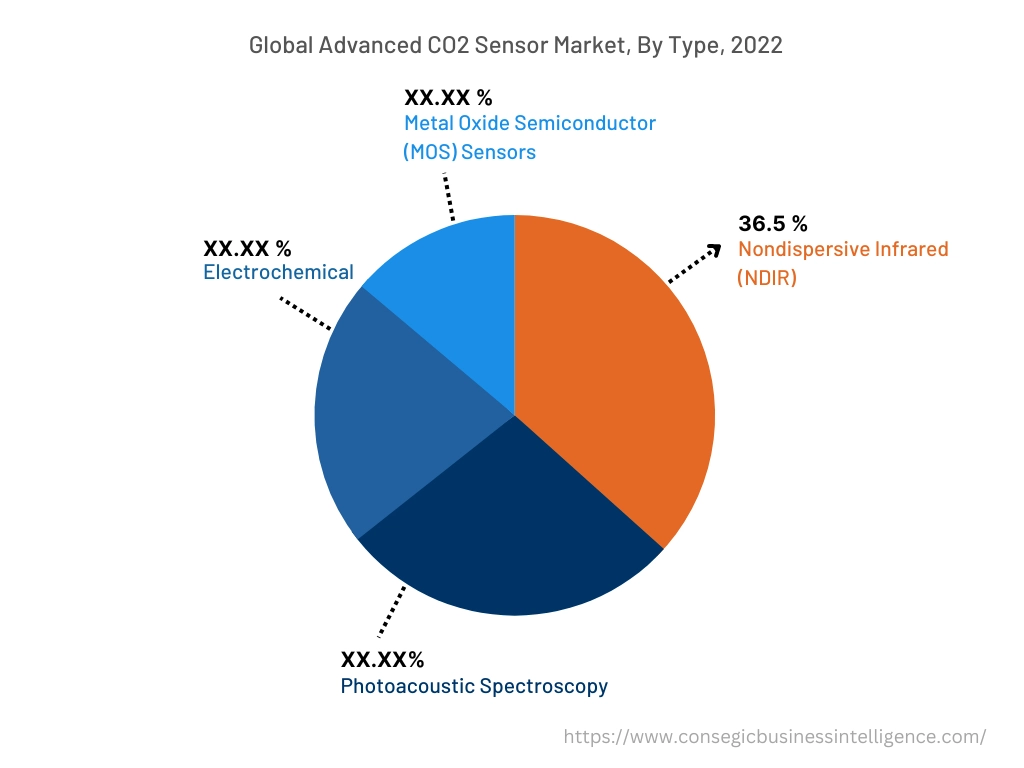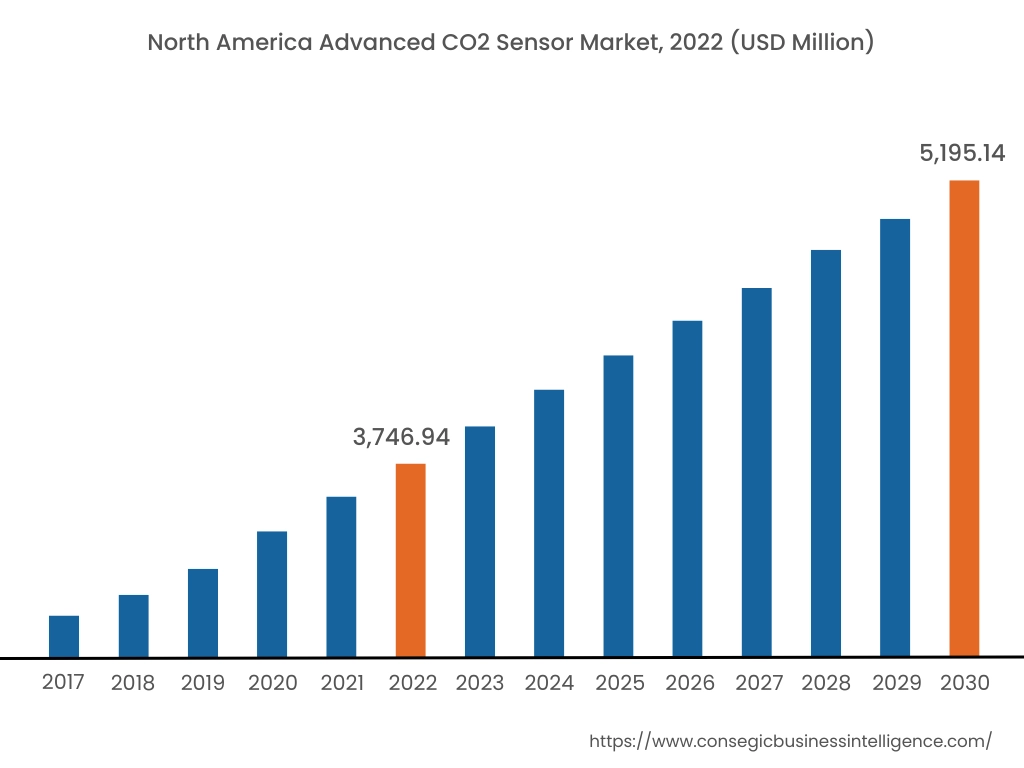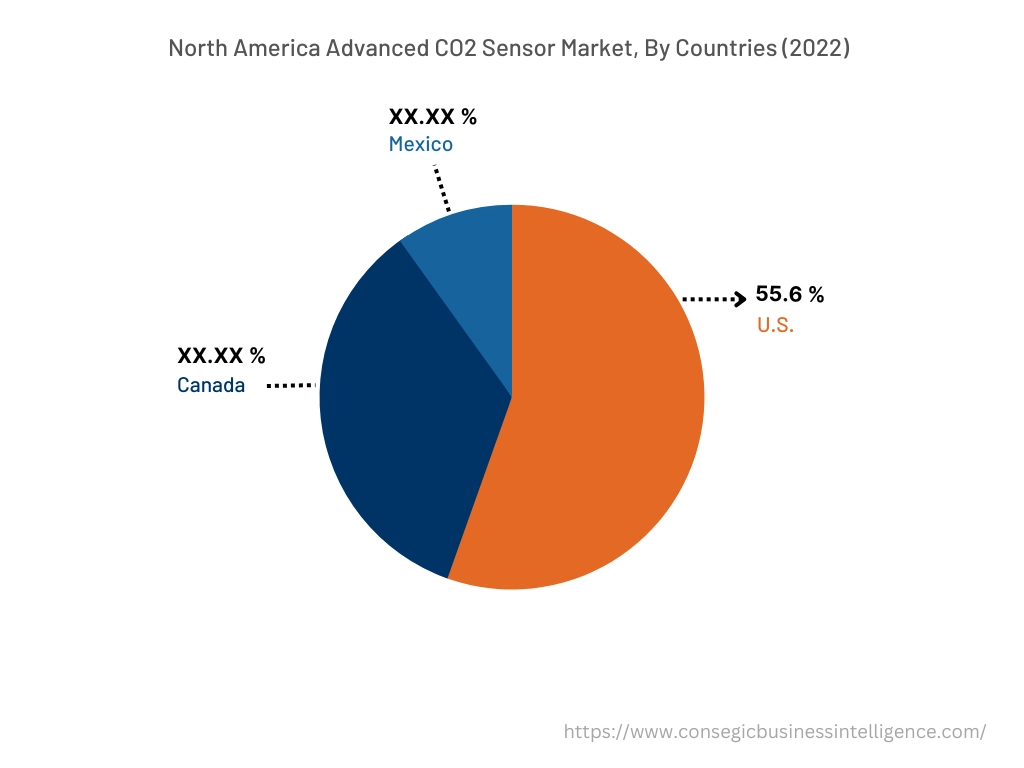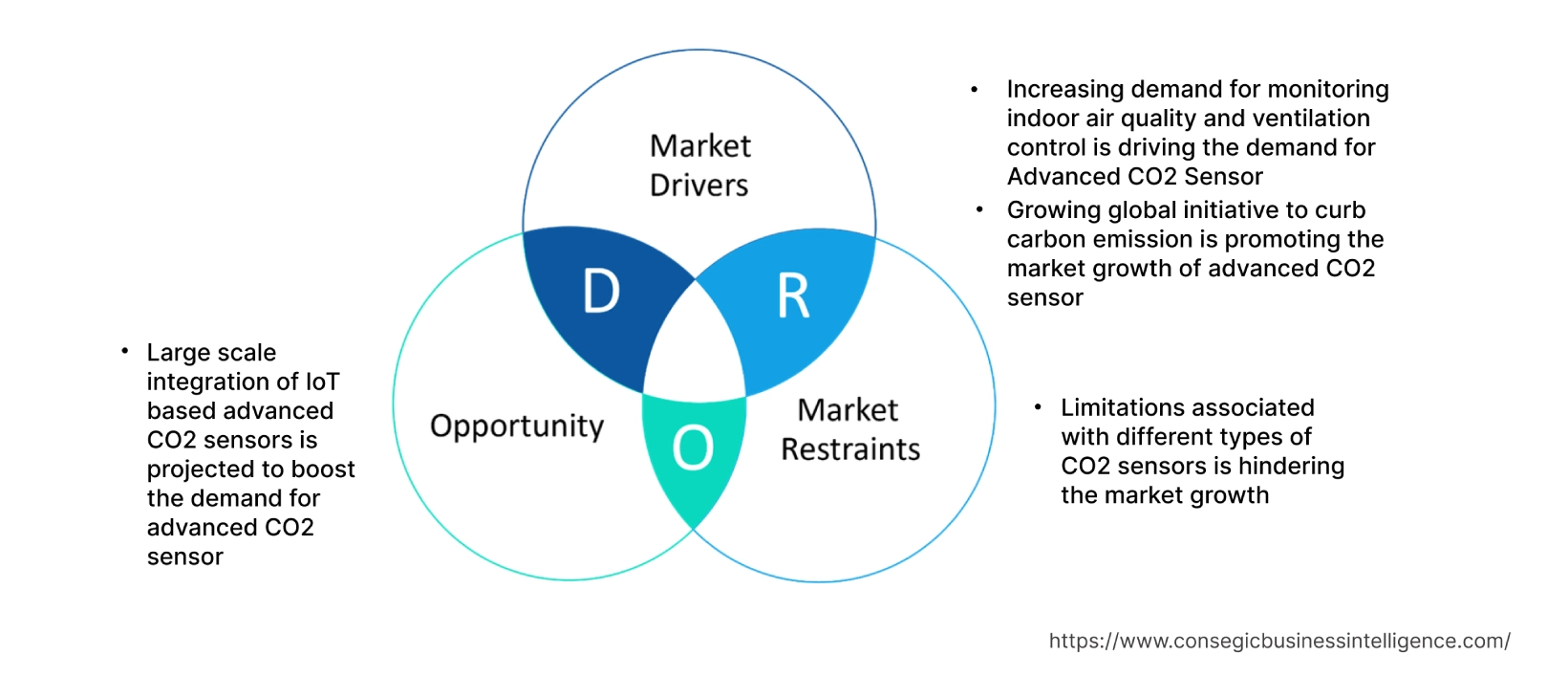Advanced CO2 Sensor Market Size :
The Advanced CO2 Sensor Market Size is estimated to reach over USD 12,281.66 Million by 2030 from a value of USD 8,837.12 Million in 2022, growing at a CAGR of 4.30% from 2023 to 2030.
Advanced CO2 Sensor Industry Scope & Overview:
An advanced CO2 Sensor is a sophisticated device employed to measure and monitor the presence of carbon dioxide levels in nearby surroundings or various environments. In addition, these sensors use advanced technology and principles to provide accurate and reliable measurements of CO2 concentrations in the environment. The sensor's key features include higher efficiency, higher accuracy, and the ability to operate in diverse environments. Moreover, they are commonly utilized for gas detection applications in places including homes, commercial buildings, industrial spaces, and others.
Advanced CO2 Sensor Market Insights :
Advanced CO2 Sensor Market Dynamics - (DRO) :
Key Drivers :
Increasing demand for monitoring indoor air quality and ventilation control is driving the advanced CO2 sensor market
Advanced CO2 sensors are majorly employed to detect the presence of CO2 and a few other gases in the environment. The excess of CO2 in the atmosphere causes various health-related concerns and may pose life-threatening conditions for an individual. The applications of sensors vary from indoor air quality monitoring and ventilation control in buildings to greenhouse gas emissions and their management. A few other applications include industrial process monitoring, climate research, and automotive applications.
According to the World Green Building Council report published in partnership with the European Climate Foundation, buildings are presently responsible for 39% of global energy-related carbon emissions, among which 28% of the emission is generated from operational emissions and 11% from materials and construction segments. Therefore, the analysis of market trends shows that the growing trend to improve human health, energy efficiency, and environmental sustainability is promoting the advanced CO2 sensor market growth.
For instance, the XENSIV PAS CO2 sensor, launched by Infineon Technologies is a photoacoustic-based CO2 sensor designed to monitor indoor air quality within spaces such as commercial buildings.
Growing global initiative to curb carbon emissions is promoting the advanced CO2 sensor market
The world is experiencing climate change and a rise in overall temperatures. It is accounted that there has been a rise in temperature by 1.1 degrees Celsius in the past decades and countries across the globe are determined to curb temperature below 1.5 degrees Celsius. Therefore, countries across the world are committing to net zero emissions policies by 2050. According to a UN report, the key countries contributing majorly to carbon emissions across the globe include China, the U.S., the European Union, India, Indonesia, the Russian Federation, and Brazil.
Accordingly, to reduce carbon emissions, globally different regulations and agreements have been created. Agreements such as the Paris Agreement are among a few of the accords, adopted in 2015 under the United Nations Framework Convention on Climate Change that aims to limit global warming below 2 degrees Celsius. Other policies include the European Union Emissions Trading System (EU ETS), which allows industries to capture carbon emissions and trade them. Moreover, regulations including Energy Efficiency Regulations target the energy consumption of buildings, appliances, and industrial processes, aiming to reduce CO2 emissions by reducing energy demand.
Accordingly, the market trends analysis shows that the implementation of regulations and accords has been playing an important role in the installation of sensors and devices thus driving advanced CO2 sensor market growth.
Key Restraints :
Limitations associated with different types of CO2 sensors are hindering the advanced CO2 sensor market
Advanced CO2 sensors are bundled with various types of disadvantages depending upon the type of sensor. NDIR-based CO2 sensors are subjected to hindering factors including complicated structure, high power consumption, and are expensive. Additionally, electrochemical CO2 sensors are subjected to limiting factors such as short life, lack of accuracy, aging, and easy drift. Moreover, semiconductor-based CO2 sensors are more sensitive to temperature changes due to external environmental conditions that hinder their reading ability. Thus, the market trends analysis shows that owing to the aforementioned limiting factors, the advanced CO2 sensor market demand is hindered.
Future Opportunities :
Large-scale integration of IoT-based CO2 sensors is projected to boost the market
IoT-based CO2 sensors are devices that use the Internet of Things technology to monitor and transmit carbon dioxide concentration data to remote server platforms. These sensors are equipped with connectivity features that allow them to communicate wirelessly over the internet, enabling them to provide real-time monitoring, analysis, and emission control. Thus, the analysis of market trends shows that a few of the key features including remote monitoring, real-time data transmission, alerts and notifications, and integration with building management systems facilities are expected to promote advanced CO2 sensor market opportunities.
Advanced CO2 Sensor Market Report Insights :
| Report Attributes | Report Details |
| Study Timeline | 2017-2030 |
| Market Size in 2030 | USD 12,281.66 Million |
| CAGR (2023-2030) | 4.30% |
| By Type | Nondispersive Infrared (NDIR), Photoacoustic Spectroscopy, Electrochemical, and Metal Oxide Semiconductor (MOS) Sensors |
| By Application | HVAC Systems, Smart Home & Buildings, Safety & Fire detection, Industrial Processes, Quality Control, and Others |
| By End Use | Automotive, Healthcare, Agriculture, Consumer Electronics, Food & Beverages, and Others |
| By Region | North America, Europe, Asia-Pacific, Latin America, and Middle East & Africa |
| Key Players | METTLER TOLEDO, Infineon Technologies AG, Munters, Amphenol Corporation, Digital Control System Inc., Gas Sensing Solutions, Honeywell International Inc., Siemens AG, Sensirion AG, ABB, Murata Manufacturing Co. Ltd., Winson, and Cubic Sensor and Instrument Co. Ltd. |
Advanced CO2 Sensor Market Segmental Analysis :
By Type :
Based on the Type, the market is categorized into nondispersive infrared (NDIR), photoacoustic spectroscopy, electrochemical, and metal oxide semiconductor (MOS) sensors. The nondispersive infrared (NDIR) segment accounted for the largest revenue of 36.5% in the year 2022 of the global advanced CO2 sensor market share. The segment is also projected to garner the fastest CAGR during the forecast period. Factors attributed include longer shelf life, non-interference in reading from other substances, better working conditions (around 1000 ppm), and others. The type of sensor has also received gold standard recognition for carbon dioxide monitoring. The sensor is based on the light absorption principle and can absorb wavelengths of light up to 4 microns.
For instance, Winson, manufacturer of NDIR-based CO2 sensors (NH-Z19C/Z19E/Z19B, and others) has a higher detection range of 400-10,000ppm and is capable of providing excellent liner output.

By Application :
Based on the application, the market is segmented into HVAC systems, smart homes & buildings, safety & fire detection, industrial processes, quality control, and others. The HVAC systems segment is accounted to generate the largest market share in 2022 of the total advanced CO2 sensor market share. HVAC systems are designed to provide quality air and require air quality monitoring sensors installed within the devices. CO2 sensor thus measures the amount of CO2 level in the environment and allows the HVAC system to operate according to the environmental requirements. CO2 sensors moreover allow HVAC systems to provide fresh air and remove excess concentrations of CO2 defined within the permissible limits. The overall process thus reduces the energy consumption of HVAC systems by proper analysis of oxygen and carbon dioxide concentrations in the air. For instance, Honeywell's C7233 & C7263 series of wall-mount CO2 sensors are designed to determine ventilation requirements for HVAC systems.
Moreover, the industrial processes segment is projected to grow at the fastest CAGR during the forecast period. As per the market analysis, to rising demand for defined minimum air quality requirements in working spaces tends to boost the market. Moreover, the expansion of industrial sectors in developing countries including China, India, Australia, and others will promote the advanced CO2 sensor market opportunities during the forecast period.
By End-Use :
Based on the End Use, the market is segregated into automotive, healthcare, agriculture, consumer electronics, food & beverages, and others. The consumer electronics industry accounted for the largest revenue share in the year 2022 of the advanced CO2 sensor market. The factors attributed to the growth of the segment include the rising trend for quality air, increasing consumer awareness towards health, the requirement for proper working conditions, and others. Moreover, as defined by European Standard EN 13779, the CO2 concentration within the room should be below 1000ppm which is raising the need for consumer electronics such as HVAC systems, air conditioning, and others. Furthermore, owing to the growing health concerns related to pollution and rising levels of air pollutant particles are driving the advanced CO2 sensor market trends.
Moreover, the healthcare industry is projected to grow at the fastest growth rate during the forecast period. The growth of the segment is anticipated due to the rising trend of health concerns for individual patients and the development of healthcare infrastructure in developing countries is expected to drive advanced CO2 sensor market expansion.
By Region :
The regional segment includes North America, Europe, Asia Pacific, Middle East and Africa, and Latin America.

North America accounted for the largest revenue share of USD 3,746.94 Million in 2022 and is expected to reach USD 5,195.14 Million by 2030. In addition, in the region, the U.S. accounted for the maximum revenue share of 55.6% in the same year. As per the advanced CO2 sensor market analysis, the adoption of sensors in the North American region is primarily driven by technological advancement in sensor technology. In addition, the region is mainly focused on environmental and individual health-related concerns. Also, the region has always focused on research and innovation coupled with growth in industrial and commercial applications has been driving the advanced CO2 sensor market demand.
Moreover, Asia-Pacific is expected to register the fastest CAGR of 4.5% during the forecast period. The growing pace of digitalization and industrialization is generating lucrative opportunities for the advanced CO2 sensor market in the region. The region has continued to progress over the decade and countries including China and India are majorly focusing on increasing their industrial production. According to the IBEF report, the Indian economy is expected to export goods valued at USD 1 trillion by 2030 owing to a boost in the manufacturing industry.

Top Key Players & Market Share Insights:
The Advanced CO2 Sensor market is highly competitive with major players providing Advanced CO2 Sensor to the national and international markets. Key players are adopting several strategies in research and development (R&D), product innovation, and application launches to hold a strong position in the Advanced CO2 Sensor market. Key players in the Advanced CO2 Sensor industry include-
- METTLER TOLEDO
- Infineon Technologies AG
- Siemens AG
- ABB
- Murata Manufacturing Co. Ltd.
- Winson
- Cubic Sensor and Instrument Co. Ltd.
- Munters
- Amphenol Corporation
- Sensirion AG
- Digital Control System Inc.
- Gas Sensing Solutions
- Honeywell International Inc.
Recent Industry Developments :
- In April 2022, RLE Technologies launched a Wi-Fi-based carbon dioxide sensor for mission-critical facilities.
- In July 2023, ZenMeasure and Sensirion collaborated to manufacture mobile CO2 detectors.
Key Questions Answered in the Report
What is Advanced CO2 Sensor? +
Advanced CO2 Sensor is a sophisticated device employed to measure and monitor the presence of carbon dioxide levels in nearby surroundings or various environments.
What specific segmentation details are covered in the advanced CO2 sensor report, and how is the dominating segment impacting the market growth? +
For instance, by type segment has witnessed Nondispersive Infrared (NDIR) as the dominating segment in the year 2022, owing to longer product life span and higher accuracy being offered by the advanced co2 sensor to the users.
What specific segmentation details are covered in the Advanced CO2 Sensor market report, and how is the fastest segment anticipated to impact the market growth? +
For instance, by end use segment has witnessed consumer electronics as the fastest-growing segment during the forecast period due to growing industrial sectors and regulations associated with health concerns of employees working in production facilities.
Which region/country is anticipated to witness the highest CAGR during the forecast period, 2023-2030? +
Asia-Pacific is anticipated to register fastest CAGR growth of 4.5% during the forecast period due to rapid pace of industrialization and growth of multiple industries including consumer electronics, industrial, healthcare, and others.


